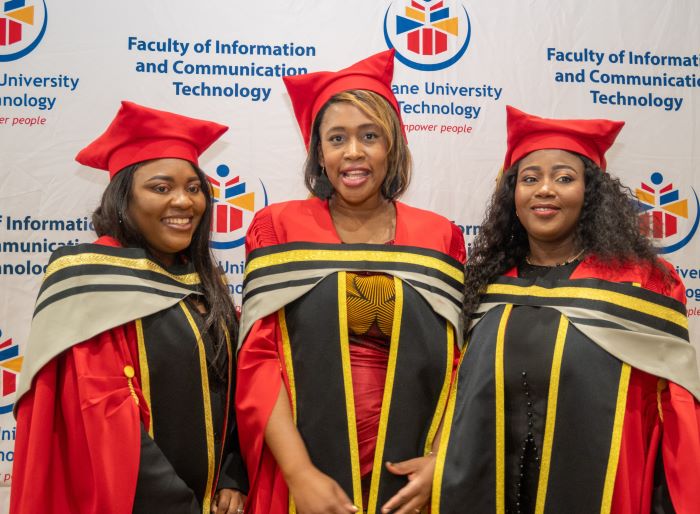by Thembeka Manetje
Three outstanding women made history when they earned their Doctor of Computing (Computer Systems Engineering) degrees from the Tshwane University of Technology's Faculty of Information and Communication Technology on 7 April 2025, This remarkable achievement stands out, not only because of their academic excellence but also due to the broader societal context in which it was accomplished.
In a field where ICT has long been perceived as a male-dominated field, the fact that all three of the University’s doctoral graduates in this discipline are women, is especially noteworthy. This accomplishment challenges the stigma surrounding the ICT sphere, proving that women can excel and lead in areas traditionally considered to be for males.
Drs Juliana Adeola Adisa, Dorcas Oladayo Esan and Moanda Diana Pholo’s respective pioneering research made unique and significant contributions to the field of computer systems engineering. Their work represents a powerful response to the biases that continue to exist in the tech world, offering inspiring examples of how women can shape the future of technology.

Three outstanding women, Drs Juliana Adeola Adisa, Dorcas Oladayo Esan and Moanda Diana Pholo, made history when they earned their Doctor of Computing (Computer Systems Engineering) degrees.
Adoption of Deep Learning Techniques for Prediction of Financial Crises: Bankruptcy and Credit Scoring
Dr Juliana Adeola Adisa’s research, titled "Adoption of Deep Learning Techniques for Prediction of Financial Crises: Bankruptcy and Credit Scoring," tackled critical financial issues. By employing a Binary Swarm Optimization (BPSO) technique alongside a Bi-LSTM-CNN-based Generative Adversarial Network (GAN) deep learning model, Dr Adisa developed the Particle Swarm Optimization Synthetic Feature Generative Adversarial Networks (PSOSF-GAN) – a novel hybrid deep learning model. This model combines a synthetic feature generation algorithm with BPSO for feature selection and a Bi-LSTM/CNN-based GAN to predict financial distress, offering a new tool for bankruptcy prediction and credit scoring.
Enhancement and Regeneration of 3-Dimensional African Artistic Images with Artificial Intelligence
Dr Dorcas Oladayo Esan’s thesis, "Enhancement and Regeneration of 3-Dimensional African Artistic Images with Artificial Intelligence," addressed challenges in the generation and accessibility of African art. With the aim of improving the quality and availability of 3D African art, Dr Esan utilized the Variational Autoencoder-Three-Dimensional Signed Distance Function Cycle Generative Adversarial Network (VAE-3DSDFCycleGAN) to enhance and regenerate 3D images from 2D African art. This breakthrough has significant implications for both artistic design and accessibility, helping preserve and share African culture in new and innovative ways.
Differentiating Lymphoma from Tuberculosis and COVID-19 Using Machine Learning and Natural Language Processing
Dr Moanda Diana Pholo’s research, titled "Differentiating Lymphoma from Tuberculosis and COVID-19 Using Machine Learning and Natural Language Processing," explored how artificial intelligence could be applied to medical diagnostics. By developing an AI-driven diagnostic framework, Dr Pholo’s study focused on using machine learning to differentiate between lymphoma, tuberculosis, and COVID-19, based on clinical indicators. This framework promises to improve disease classification accuracy and assist in more timely and effective diagnosis in healthcare settings.
Together, Drs Adisa, Esan and Pholo’s research embodies the transformative power of women in technology. Their groundbreaking contributions highlight the increasing need for diversity and inclusivity in the ICT sector, demonstrating that women are not only capable but are leading the way in shaping the future of technology, finance, healthcare and art.
FoICT proudly celebrates these remarkable women and looks forward to the lasting impact their work will have on the global stage. Their achievements serve as an inspiring reminder to all that barriers are meant to be broken and that women are integral to the advancement of the tech world.
